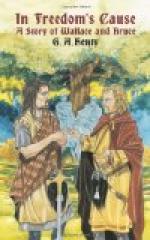A short time afterwards, to Archie’s immense grief, Sir William Wallace was betrayed into the hands of the English. Several Scotchmen took part in this base act, the principal being Sir John Menteith. Late historians, in their ardour to whitewash those who have for ages been held up to infamy, have endeavoured to show that Sir John Menteith was not concerned in the matter; but the evidence is overwhelming the other way. Scotch opinion at the time, and for generations afterwards, universally imputed the crime to him. Fordun, who wrote in the reign of Robert Bruce, Bowyer, and Langtoft, all Scotch historians, say that it was he who betrayed Wallace, and their account is confirmed by contemporary English writings. The Chronicle of Lanercost, the Arundel MSS., written about the year 1320, and the Scala Chronica, all distinctly say that Wallace was seized by Sir John Menteith; and finally, Sir Francis Palgrave has discovered in the memoranda of the business of the privy council that forty marks were bestowed upon the young man who spied out Wallace, sixty marks were divided among some others who assisted in his capture, and that to Sir John Menteith was given land of the annual value of one hundred pounds — a very large amount in those days.
The manner in which Wallace was seized is uncertain; but he was at once handed by Sir John Menteith to Sir John Seagrave, and carried by him to London. He was taken on horseback to Westminster, the mayor, sheriffs, and aldermen, with a great number of horse and foot, accompanying him. There the mockery of a trial was held, and he was in one day tried, condemned, and executed. He defended himself nobly, urging truly that, as a native born Scotsman, he had never sworn fealty or allegiance to England, and that he was perfectly justified in fighting for the freedom of his country.
Every cruelty attended his execution. He was drawn through the streets at the tails of horses; he was hung for some time by a halter, but was taken down while yet alive; he was mutilated and disembowelled, his head then cut off, his body divided in four, his head impaled over London Bridge, and his quarters distributed to four principal towns in Scotland. Such barbarities were common at executions in the days of the Norman kings, who have been described by modern writers as chivalrous monarchs.
A nobler character than Wallace is not to be found in history. Alone, a poor and landless knight, by his personal valour and energy he aroused the spirit of his countrymen, and in spite of the opposition of the whole of the nobles of his country banded the people in resistance against England, and for a time wrested all Scotland from the hands of Edward. His bitter enemies the English were unable to adduce any proofs that the epithets of ferocious and bloodthirsty, with which they were so fond of endowing him, had even a shadow of foundation, and we may rather believe the Scotch accounts that his gentleness and nobility of soul were equal to his valour. Of his moderation and wisdom when acting as governor of Scotland there can be no doubt, while the brilliant strategy which first won the battle of Stirling, and would have gained that of Falkirk had not the treachery and cowardice of the cavalry ruined his plans, show that under other circumstances he would have taken rank as one of the greatest commanders of his own or any age.




